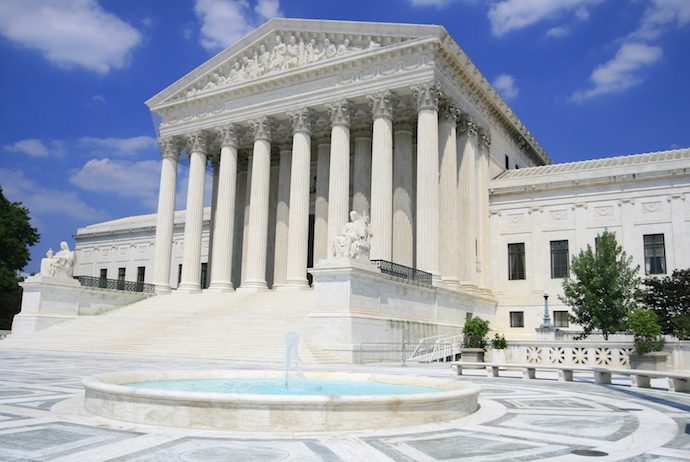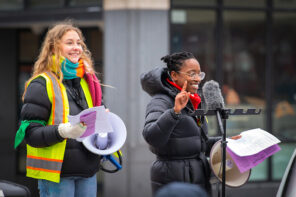The Supreme Court heard oral arguments this morning in Masterpiece Cakeshop v. Colorado Civil Rights Commission, the case involving a Colorado baker, Jack Phillips, who for religious reasons refused to create a custom cake for a same-sex wedding reception.
The oral arguments made one thing clear: same-sex marriage is settled law. But Masterpiece Cakeshop will likely be only one in a series of cases that will seek to define the contours of the post-Obergefell world—in other words, to negotiate the terms of a settlement between those with different views on same-sex marriage.
At the heart of today’s arguments was the complex interaction between the government’s interest in protecting members of minority groups from discrimination on the one hand, and individuals’ freedoms of expression (and, to a lesser extent, religious exercise) on the other. In decisions reaching back more than half a century, the Court has strongly supported both kinds of claims. In 1968, it held in Newman v. Piggie Park Enterprises that even the most sincerely held religious beliefs could not justify a restaurant owner refusing to serve black and white customers on an equal basis. Yet in 1995, in Hurley v. Irish-American Gay, Lesbian, and Bisexual Group of Boston, the Court ruled that the organizers of a private St. Patrick’s Day parade could not be obligated to include an LGBT group among the marchers as that would violate their freedom of expression. Advocates on both sides lost no time in highlighting such precedents.
Several of the justices pointed to the difficulty of drawing a clear line that demarcates legitimate free speech protections from legalized discrimination. They served up a whole host of hypotheticals that illustrated the difficulties involved. Justice Elena Kagan asked about other personnel whose creative talents help make weddings into joyful celebrations: jewelers, chefs, florists, hair stylists, designers of invitations and menus, and make-up artists. “It’s even called an artist, the make-up artist,” she quipped.
On the other side, Chief Justice John Roberts imagined a contrary scenario. What about a Catholic legal clinic that offers pro bono services to members of the public: could such an organization legitimately refuse to help a same-sex couple with a contractual dispute related to one of the suppliers for their wedding? And Justice Neil Gorsuch wondered about a baker who, after accepting a commission to design a cake with a red cross design in honor of a humanitarian leader, was then asked to design an identical cake to commemorate the Ku Klux Klan. Could the baker say no?
As Justice Stephen Breyer put it, “We need a distinction [among these scenarios] to not undermine every civil rights law.” Breyer returned to this point repeatedly, but the two sides were not always clear in helping the Court to decide how to preserve both freedom from discrimination and freedom of expression. Arguing on behalf of the conservative legal group, the Alliance Defending Freedom, that has championed Phillips’s cause, Kristen Waggoner acknowledged that a bakery could not refuse to supply premade goods on account of a customer’s sexual orientation, since any artistry involved in the creation of such goods would have taken place well before a customer appeared. But she struggled to articulate why her argument that Phillips’s cake-making is a protected form of expression would not also apply to other service professionals. If “the artist speaks” through his cake, as Waggoner said to Justice Ruth Bader Ginsberg, why only some kinds of artists? U.S. Solicitor General Noel Francisco, appearing for the Trump administration on behalf of Phillips, sought to resolve this dilemma by pointing to lower-court decisions that asked whether a particular object was predominantly artistic or predominantly utilitarian in its function.
Masterpiece Cakeshop is about the permissibility of discrimination on the basis of sexual orientation, but the specters of earlier civil rights battles continually stalked the courtroom. The discussion especially called upon analogies from the context of racial discrimination. Waggoner conceded that if the case were about an interracial rather than a same-sex wedding, Phillips could not claim First Amendment protections for his conduct since the government has a particularly compelling interest in prohibiting racial discrimination, and Phillips would be discriminating against a certain kind of customer rather than refusing to convey a particular message with which he disagrees.
Waggoner insisted that Phillips’s objection to providing a custom cake for Charlie Craig and David Mullins was about their conduct—that is, about their getting married to each other—rather than about who they are. Such a distinction between LGBT status and LGBT conduct is not new, but courts have tended to view it as tenuous, especially in recent years. (Incidentally, however, Waggoner maintained that Phillips could legitimately refuse to make a custom cake for an interreligious wedding: would that be because one can choose one’s religious identity?)
To the contrary, David Cole noted that his clients, Charlie Craig and David Mullins, had faced “identity-based discrimination” just as surely as someone who was mistreated because of her race. If, following Piggie Park, it is unacceptable to cite one’s religious beliefs to justify racial discrimination, then the Court must reach the same conclusion with regard to sexual orientation or else risk rendering LGBT Americans a permanent second class of citizens.
The Court’s more progressive justices echoed Cole in enumerating scenarios where members of minority groups could find themselves the object of rampant discrimination if the decision here goes in Phillips’s favor. But it was not one side alone that cited harms to the dignity of their clients as an important element of the case. Employing rhetoric likely designed to appeal to swing Justice Anthony Kennedy, whose majority opinion in Obergefell touched extensively on the dignity interests of LGBT people, Waggoner depicted Phillips as a man who sought to live out his faith and had been persecuted by a Colorado state civil rights commission that particularly targeted religious believers. The justices sympathetic to Phillips appeared to embrace this characterization, with Justice Samuel Alito pressing Frederick Yarger, the attorney for the commission, on what he called that body’s history of viewpoint discrimination.
How the Court decides Masterpiece Cakeshop will ultimately be a matter of which framework the justices use to analyze the facts in front of them. On the side of Craig and Mullins, Cole argued that it would be impossible for the Court to develop a clear doctrine that could pinpoint just how much a particular artisan is engaged in constitutionally protected expression. Colorado’s antidiscrimination law is viewpoint-neutral. It governs not expression but conduct—in Phillips’s case, the operation of a retail bakery—and Phillips fell afoul of the law by refusing service to potential clients solely because of their sexual orientation.
But Justice Kennedy objected that Cole’s “identity framework” is “too facile,” since it doesn’t sufficiently account for Phillips’s claim that he decided not to serve the couple not because of who they are, but rather because of what message he perceived them to be asking him to convey. And Chief Justice Roberts echoed Kennedy’s Obergefell opinion to the effect that Phillips is one of the “decent and honorable people” whom the Court had acknowledged would, and could, disagree on the question of same-sex marriage.
Same-sex marriage may be settled law, but our post-Obergefell society is clearly continuing to wrestle with an issue on which substantial numbers of Americans continue to differ, usually for religious reasons. Masterpiece Cakeshop gets at a number of disputed questions, but regardless of which way the justices rule, others will likely go unanswered.
Beginning to thread this needle will likely be the task of Justice Kennedy, who did not tip his hand in today’s arguments about how he intends to reconcile his landmark gay-rights decisions with his equally passionate opinions concerning religious freedom. But in light of persistent rumors about Kennedy’s impending retirement, one has to ask: if Kennedy’s successor is, like Neil Gorsuch, a Trump appointee with a strong commitment to prioritizing religious freedom, what limitations might a future court impose on Obergefell’s promise of equality?





